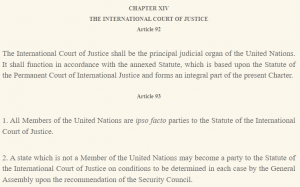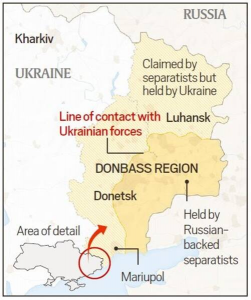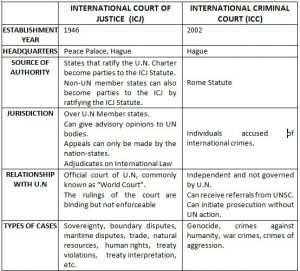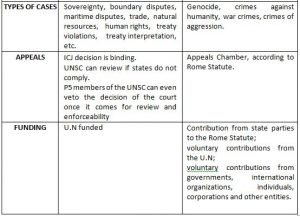THE CONTEXT: On 26 February 2022 Ukraine lodged a case against Russia at the ICJ which was centered on the interpretation of a 1948 treaty on the prevention of genocide, signed by both Russia and Ukraine. The court is named in the treaty itself as the forum for resolving disputes related to genocide and Ukraine’s suit argues that Russia has misinterpreted the treaty in several ways. This article explains the whole issue in detail and analyses the efficacy of ICJ in the present times.
WHAT IS THE INTERNATIONAL COURT OF JUSTICE (ICJ)
ABOUT ICJ:
- The ICJ is the principal judicial organ of the United Nations (UN). The International Court of Justice is also known as the World Court. It was established in June 1945 by the Charter of the United Nations and began work in April 1946.
- The seat of the Court is at the Peace Palace in The Hague (Netherlands). Of the six principal organs of the United Nations, ICJ is the only one not located in New York (United States of America).
- Its official working languages are English and French
- All members of the UN are ipso facto parties to the statute, but this does not automatically give ICJ jurisdiction over disputes involving them. The ICJ gets jurisdiction only on the basis of the consent of both parties. The Charter of the United Nations was signed on 26 June 1945, in San Francisco, at the conclusion of the United Nations Conference on International Organisation and came into force on 24 October 1945. The Statute of the International Court of Justice is an integral part of the Charter.

Figure 1 Charter of the United Nations
ITS ORIGIN:
- The court is the successor to the Permanent Court of International Justice (PCIJ), which was brought into being by the League of Nations, and which held its inaugural sitting at the Peace Palace in The Hague, Netherlands, in February 1922.
- After World War II, the League of Nations and PCIJ were replaced by the United Nations and ICJ respectively.
- The PCIJ was formally dissolved in April 1946, and its last president, Judge José Gustavo Guerrero of El Salvador, became the first president of the ICJ.
ITS COMPOSITION:
- The ICJ consists of a panel of 15 judges elected by the United Nations General Assembly (UNGA) and United Nations Security Council (UNSC) for nine-year terms. These organs vote simultaneously but separately. In order to be elected, a candidate must receive an absolute majority of the votes in both bodies. The Court does not include more than one national of the same State. Moreover, the Court as a whole represents the main forms of civilization and the principal legal systems of the world.
- One-third of the Court is elected every three years; Judges are eligible for re-election.
- The 15 judges of the Court are distributed in the following regions:
- Three from Africa.
- Two from Latin America and the Caribbean.
- Three from Asia.
- Five from Western Europe and other states.
ROLES AND RESPONSIBILITIES:
- The Court settles legal disputes submitted to it by States, in accordance with international law. It also gives advisory opinions on legal questions referred by authorised UN organs and specialised agencies. Judgments in disputes between States are binding.
- The Court decides disputes between countries, based on the voluntary participation of the States concerned. If a State agrees to participate in a proceeding, it is obligated to comply with the Court’s decision.
WORKING OF THE COURT:
- States have no permanent representatives accredited to the Court. They normally communicate with the Registrar through their Minister for Foreign Affairs or their ambassador accredited to the Netherlands.
- The sources of law that the Court must apply are international treaties and conventions in force; international custom; the general principles of law; judicial decisions; and the teachings of the most highly qualified publicists*. Moreover, if the parties agree, the Court can decide a case ex aequo et Bono, i.e., without confining itself to existing rules of international law.
A *publicist is an international law scholar or a scholarly organization (e.g., American Law Institute). However, Article 38 of the ICJ Statute indicates that only teachings (writings) of “the most highly qualified publicists” are considered to be a source of international law. Thus, not every article or book about an international law topic would be considered a source of international law.
A CRITICAL ANALYSIS OF THE FUNCTION AND RESPONSIBILITIES OF ICJ
- The International Court of Justice (ICJ) is the international community’s legal guardian. The ICJ is frequently called upon to defuse crisis situations, help normalize relations between states, and reactivate stalled negotiation processes. It resolves legal disputes submitted to it by States in accordance with international law, as well as provides advisory opinions on legal questions referred to it by authorized United Nations organs and specialized agencies. Within its limited jurisdiction, the ICJ has resolved significant international disputes, thereby contributing to international peace and security.
- In carrying out its mandate, the Court not only contributes to the strengthening of international law’s role in international relations but also to its development and is increasingly being used as a forum for the resolution of environmental disputes, particularly those involving transboundary
- harm, as well as other disagreements affecting the conservation of living resources, environmental protection, or potentially adverse effects on human health.
- Albeit the court cannot enact new laws in the same way that a regulator can, the Court can clarify, refine, and interpret international law rules. In the present scenario of Russia’s military action on Ukraine ICJ’s decision is binding on Russia and constitutes part of its international legal obligations. If Russia continues its military actions, it will be a brazen violation of international law.
DISCOURSE ON UKRAINE’S CASE AGAINST RUSSIA AT ICJ
UKRAINE’S APPLICATION AGAINST RUSSIAN FEDERATION:
- Ukraine contends that Russian Federation has falsely claimed that acts of genocide have been committed in the Luhansk and Donetsk oblasts of Ukraine and based on such claims Russia initiated a special military action and recognized the so-called ‘Donetsk People’s Republic’ and ‘Luhansk People’s Republic’.
- Ukraine “emphatically denies” that such genocide has occurred and states that Russia has no lawful basis to take action in and against Ukraine for the purpose of preventing and punishing any purported genocide.
- Ukraine used the clause of the Genocide Convention of (1948) to get the ICJ to hear the case. The top court of the United Nations has ordered Russia to “immediately suspend” its military operations in Ukraine.
- It is a “provisional measures” order – an emergency ruling made before the court hears the whole case. Provisional measures are binding. It means even if Russia maintains incorrectly that the invasion is legal, it is now breaching international law anyway by failing to comply with the ICJ’s order. However, a binding ruling is not the same as an enforceable one. Just as there is no global government to give the ICJ more power, there is no global police to enforce its decisions.
Article I of the Convention on the Prevention and Punishment of the Crime of Genocide (Genocide Convention), 1948 as interpreted by the ICJ in the past makes it an obligation for any state not to commit genocide and also gives an extraterritorial scope to signatory states to prevent genocide. (This became the basis for Russia to initiate a special military action against Ukraine.) Ukraine also contends this interpretation and says that no rule in international law automatically gives one state a right to invade another state to stop genocide.
Article VIII states that any contracting party can unilaterally approach the competent organs of the United Nations in matters related to the acts of genocide.
Article IX states that “Disputes between the Contracting Parties relating to the interpretation, application or fulfillment of the present Convention, including those relating to the responsibility of a State for genocide or for any of the other acts shall be submitted to the International Court of Justice at the request of any of the parties to the dispute.” (This became the basis for Ukraine to unilaterally approach ICJ as both Ukraine and Russia are parties to the Genocide Convention.)
Russia has rejected the order by the ICJ to immediately suspend its military operations in Ukraine by saying that:
- Both sides had to agree to end the hostilities for the ruling to be implemented.
- The ruling was not valid as no consent from both sides can be obtained in this case.
- Though Russia boycotted a hearing on the case but argued in a written filing that the court didn’t have jurisdiction and also said it was acting in self-defense with the invasion.
STANCE OF JUSTICE DALVEER BHANDARI ON THE ISSUE:
- Bhandari was one of the two judges at the world court whose vote is contrary to their respective countries’ stance at the United Nations General Assembly (UNGA).
- At the United Nations (UN), India’s stand has been that diplomacy and dialogue are the solutions to the conflict between Russia and Ukraine. At the UN General Assembly on 2 March 2022, India urged both sides to focus on diplomacy to end the war and abstained from voting on the matter.
- Unlike in the UN, in the ICJ, there is no option of abstention, and ICJ judges vote in their individual capacities, and they vote on the merits of that. A judge’s opinion at the world court is in his or her individual capacity and does not reflect their respective countries’ stand on the issue.
INDIA AND ICJ
ACCEPTING THE JURISDICTION OF ICJ:
- In September 2019 India declared the matters over which it accepts the jurisdiction of the ICJ. This declaration was revoked and replaced the previous declaration made in September 1974 and September 1959.
- Among the matters over which India does not accept ICJ jurisdiction are: “disputes with the government of any State which is or has been a Member of the Commonwealth of Nations”, and “disputes relating to or connected with facts or situations of hostilities, armed conflicts, individual or collective actions taken in self-defense…”
- The declaration, which includes other exceptions as well, has been ratified by Parliament.
PARTY TO A CASE AT ICJ: India has been a party to a case at the ICJ on six occasions, four of which have involved Pakistan. They are:
- Right of Passage over Indian Territory (Portugal v. India, culminated in 1960) – Ruling in India’s favour.
- Appeal Relating to the Jurisdiction of the ICAO Council (India v. Pakistan, culminated 1972) – ICJ rejected Pakistan’s objection.
- Trial of Pakistani Prisoners of War (Pakistan v. India, culminated 1973) – Pakistan choose not to move ahead with the proceedings.
- Aerial Incident of 10 August 1999 (Pakistan v. India, culminated in 2000) – ICJ rejected Pakistan’s contention.
- Obligations concerning Negotiations relating to Cessation of the Nuclear Arms Race and to Nuclear Disarmament (Marshall Islands v. India, culminated 2016) – The court ruled that it does not have any jurisdiction on the issue in the absence of a dispute between the two countries
- Kulbhushan Jadhav (India v. Pakistan, culminated 2019) – The ICJ held that Pakistan was in clear violation of the rights and obligations described under the Vienna Convention on Consular relations 1963 and ruled in favour of India. Jadhav still remains in Pakistan Jail.
INDIANS AS MEMBERS OF ICJ: Four Indians have been members of the ICJ so far:
- Justice Dalveer Bhandari, former judge of the Supreme Court, has been serving at the ICJ since 2012.
- Former Chief Justice of India R S Pathak served from 1989-to 91.
- Former Chief Election Commissioner of India Nagendra Singh from 1973-88. Singh was also president of the court from 1985-to 88 and vice-president from 1976-to 79.
- Sir Benegal Rau, who was an advisor to the Constituent Assembly, was a member of the ICJ from 1952-to 53.
LIMITATIONS ON THE FUNCTIONING OF ICJ
ICJ suffers from certain limitations, these are mainly structural, circumstantial, and related to the material resources made available to the Court.
JURISDICTION TO TRY INDIVIDUALS:
- It has no jurisdiction to try individuals accused of war crimes or crimes against humanity.
- As it is not a criminal court, it does not have a prosecutor able to initiate proceedings.
HUMAN RIGHTS VIOLATION ALLEGATIONS FROM INDIVIDUALS: The International Court of Justice differs from other courts such as:
- The Court of Justice of the European Union (Luxembourg), whose role is to interpret European Community legislation uniformly and rule on its validity,
- The European Court of Human Rights (France) and the Inter-American Court of Human Rights (Costa Rica), which deal with allegations of violations of the human rights conventions under which they were set up.
- These three courts can entertain applications from individuals as well as from States which is not possible for the International Court of Justice.
NOT A SPECIALIST COURT:
- The jurisdiction of the International Court of Justice in general thereby differs from that of specialist international tribunals, such as the International Tribunal for the Law of the Sea (ITLOS).
- ITLOS is an independent judicial body established by UNCLOS to adjudicate disputes arising out of the convention.
- United Nations Convention on the Laws of the Sea (UNCLOS) was adopted in 1982 to establish jurisdictional limits over the ocean areas and regulate activities in international waters, including sea-bed mining and cable laying, etc.
NOT A SUPREME COURT:
- The Court is not a Supreme Court to which national courts can turn; it does not act as a court of last resort for individuals nor is it an appeal court for any international tribunal. It can, however, rule on the validity of arbitral awards.
CANNOT INITIATE PROCEEDING SUO MOTO:
- The Court can only hear a dispute when requested to do so by one or more States.
- It cannot deal with a dispute on its own initiative.
- Neither is it permitted, under its Statute, to investigate and rule on acts of sovereign States as it chooses.
DO NOT HAVE A COMPULSORY JURISDICTION:
- The ICJ only has jurisdiction based on consent, not compulsory jurisdiction.
DO NOT ENJOY FULL POWERS:
- It does not enjoy a full separation of powers, with permanent members of the Security Council being able to veto enforcement of cases, even those to which they consented to be bound.
ABOUT GENOCIDE CONVENTION
- The Convention on the Prevention and Punishment of the Crime of Genocide (Genocide Convention) is an instrument of international law that codified for the first time the crime of genocide. It was the first human rights treaty adopted by the General Assembly of the UN on 9 December 1948.
- It signified the international community’s commitment to ‘never again’ after the atrocities committed during the Second World War and its adoption marked a crucial step towards the development of international human rights and international criminal law as we know it today.
- According to the Genocide Convention, genocide is a crime that can take place both in times of war as well as in the time of peace. The definition of the crime of genocide, as set out in the Convention, has been widely adopted at both national and international levels, including in the 1998 Rome Statute of the International Criminal Court (ICC).
- Importantly, the Convention establishes on State Parties the obligation to take measures to prevent and punish the crime of genocide, including by enacting relevant legislation and punishing perpetrators, “whether they are constitutionally responsible rulers, public officials or private individuals” (Article IV). Those obligations, in addition to the prohibition not to commit genocide, have been considered norms of international customary law and therefore, binding on all States, whether or not they have ratified the Genocide Convention.
- India is a signatory to this convention.

THE WAY FORWARD
- The ICJ can only hear a dispute when requested to do so by one or more States and cannot deal with a dispute on its own initiative. The power of the court shall be expanded regarding international laws to take Suo moto cognizance and initiate proceedings to maintain international peace and order.
- ICJ shall also be given the power to hear the matters which have already been decided by other international tribunals.
- Though the ICJ can only hear cases by the states it shall also accept applications from individuals as well as international organizations.
- The rulings of the court are binding but not enforceable on states and the onus lies on other UN organs for their implementation. This leads to a lack of confidence in the efficacy of the court. The court shall be given some institutional powers to make it more efficient.
THE CONCLUSION: While the court did not decide on whether Russia has breached the Genocide Convention, as this is a question of merits, it did express doubt over whether a country can unilaterally use force against another country for punishing or preventing an alleged act of genocide. This indicates that Russia’s use of force is difficult to justify under the Genocide Convention. Just because authoritarian populist leaders don’t care for international law does not diminish its significance. International law, even if not sufficient, is necessary to maintain global order. The ICJ decision is an impactful step in that direction.
MAINS PRACTICE QUESTION:
- “India has accepted the jurisdiction of International Court of Justice on various issues barring a few such as connected with facts or situations of hostilities, armed conflicts, individual or collective actions taken in self-defense.” In the context of changing geopolitical situations elaborate on the given statement.
- The International Court of Justice (ICJ) suffers from structural, circumstantial, and material limitations. How can the court be made more effective to help in redressing interstate disputes and in maintaining global peace?
ADD TO YOUR KNOWLEDGE
Difference between the International Court of Justice (ICJ) and the International Criminal Court(ICC)






